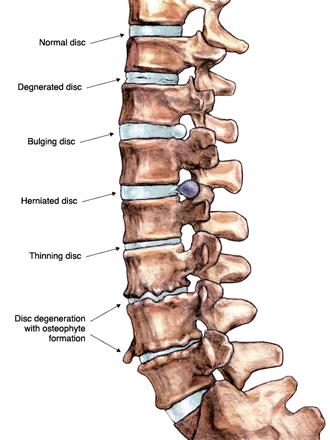 Degenerative disc disease is one of the most common causes of low back pain, and also one of the most misunderstood. Many patients diagnosed with low back pain caused by degenerative disc disease are left wondering exactly what this diagnosis means for them. Common questions that are often on patients’ minds include:
Degenerative disc disease is one of the most common causes of low back pain, and also one of the most misunderstood. Many patients diagnosed with low back pain caused by degenerative disc disease are left wondering exactly what this diagnosis means for them. Common questions that are often on patients’ minds include:
- If I have low back pain from degenerative disc disease in my thirties, how much worse will it become with age?
- Will the degenerative disc disease become a crippling condition? Will I end up in a wheelchair?
- Should I restrict my activities?
- Can I still play sports?
- Will the degenerative disc disease spread to other parts of the spine?
- Will the low back pain from degenerative disc disease cause any permanent damage?
Definition
When we are born, the disc is comprised of about 80% water, which gives it its spongy quality and allows it to function as a shock absorber. As we age, the water content decreases and the disc becomes less capable of acting as a shock absorber. As discs lose their water content due to aging, they lose their height, bringing the vertebrae closer together. As a result, the nerve openings in your spine become more narrow. When this happens, the discs don’t absorb the shocks as well, particularly when you are walking, running, or jumping. Wear and tear, poor posture, and incorrect body movements can also weaken the disc, causing disc degeneration.
Causes
For some of us, degenerative disc disease is part of the natural process of growing older. As we age, our intervertebral discs can lose their flexibility, elasticity, and shock-absorbing characteristics. For others, degenerative disc disease can stem from an injury to the back.
Symptoms
If you have any of the following symptoms, you may be suffering from degenerative disc disease. A complete and thorough examination at Georgia Clinic of Chiropractic can give you a better understanding of the underlying causes of your pain, whether you suffer from the disease and if chiropractic can help you.
- Pain that is worse when sitting. While seated, the discs of the lower back have three times more load on them than when standing.
- Pain that gets worse when bending, lifting or twisting
- Feeling better while walking or even running than while sitting or standing for long periods of time
- Feeling better changing positions often or lying down
- Periods of severe pain that comes and goes
- Pain can affect the low back, buttocks and thighs or the neck, depending on where the affected disc is, radiating to the arms and hands
Treatment
Chiropractors are specially trained to diagnose the underlying causes of back pain and to recognize when specific types of treatment may be either ineffective or harmful in situations where patients have degenerative disc disease. Since they are often skilled in a wide range of conservative, non-surgical therapies, most chiropractors will recommend low-force, non-thrusting techniques in situations involving disc degeneration and related complications. They may also employ traditional spinal adjustments based upon the results of a careful evaluation of the patient. Your initial evaluation at Georgia Clinic of Chiropractic will include a detailed and thorough analysis that includes the screening of degenerative disc disease. Regular chiropractic care takes pressure off sensitive neurological tissue, increases range of motion, restores blood flow, reduces muscle tension, and creates a series of chemical reactions in the body (such as endorphin release) that act as natural painkillers.
Left untreated, and your degenerative disc disease will only worsen, possibly leading to the only inevitable choice of back surgery. The apparent risks associated with back surgery, and specifically the type of surgery recommmended by most medical doctors for degenerative disc disease, can make one cringe. One of the quieter and less talked about consequences of back surgery is failed back surgery syndrome (FBSS). Former professional wrestler Hulk Hogan publicly spoke out about his experiences with FBSS, citing that despite numerous back surgeries, his condition continued to deteriorate, and his back problems came to a head in late 2010 when he suffered some massive back spasms that landed him in the hospital.
At Georgia Clinic of Chiropractic we want YOU to remain in control of your healthcare. We welcome patients to ask any questions they may have, and addressing any concerns about your health and specifically your chiropractic treatment are an integral part of your patient experience here. We believe an educated patient is a happier patient, and one of the best ways to remain in control over your own care is getting your how’s, why’s, and what’s answered.
Georgia Clinic of Chiropractic is conveniently located off Furys Ferry Rd in Martinez, Georgia and provides quality chiropractic care to the Augusta, Martinez, and Evans communities. To schedule an appointment, call (706) 814-5053 or visit www.georgia-clinic.com for more information.
